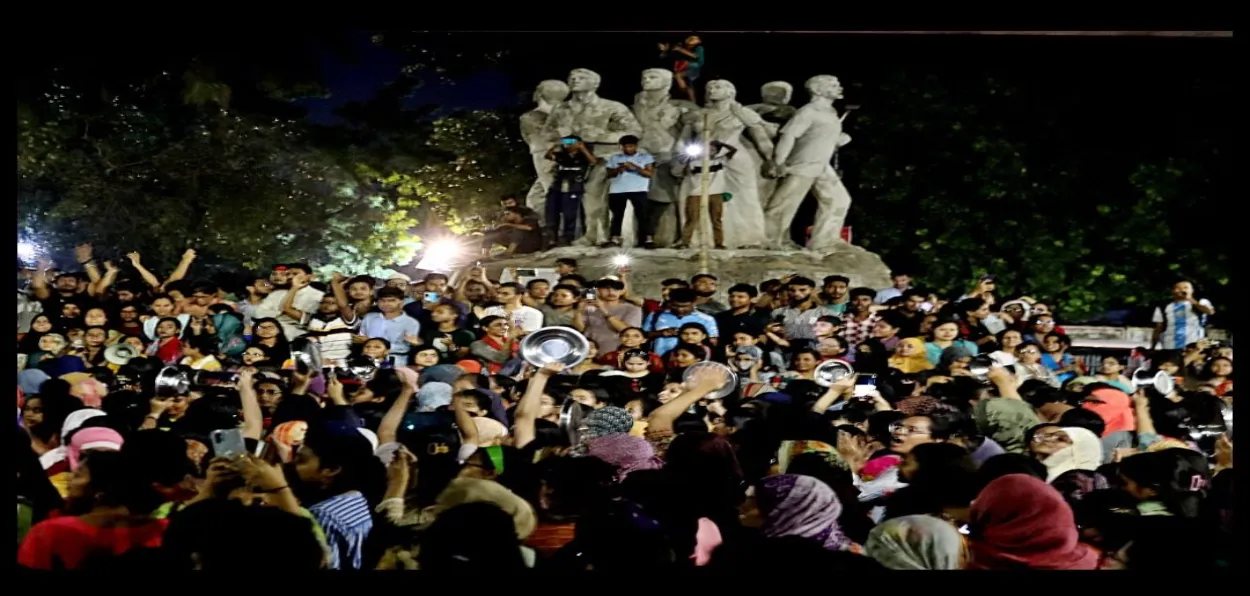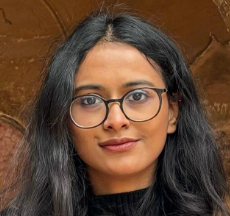
 Ankita Sanyal
Ankita Sanyal
Dhaka University Central Students’ Union (DUCSU) recently witnessed Oikkoboddho Shikkharthi Jote (or United Students’ Alliance), backed by Jamaat-e-Islami student wing Islami Chhatra Shibir (ICS), winning 23 out of the 28 posts, securing all three top positions— Vice President (VP), General Secretary (GS), and Assistant General Secretary (AGS), and marking Shibir’s historic win for the first time in Dhaka University since 1971.
With the resurgence of Islamist politics in Bangladesh since the fall of Sheikh Hasina's elected government, and Dhaka University’s significance as being the barometer of the political climate in the country, earning the popular name of Bangladesh’s ‘second parliament’, the DUCSU mandate needs careful attention.
Dhaka University has been the harbinger of major political movements in the country and the intellectual hub of resistance voices—be it Bengalees’ undying zeal for protecting their mother tongue in the 1952 Bengali Language Movement, the demand for East Pakistan’s political and economic autonomy in the 1966 Autonomy Movement, or protest against Pakistan’s military regime in the 1969 uprising.
It is precisely for this reason that the Pakistani military regime, which loathed Dhaka University, launched Operation Searchlight, starting its brutal military crackdown first on the university campus in 1971. This ignited the Liberation War, resulting in the emergence of Bangladesh as an independent nation.
Post 1971, Dhaka University maintained its unique hold as the bastion of Bangladesh’s intellectual discourse, rooted in progressive, secular, and democratic values. Its vibrant political activism has given many influential future leaders in the country, thereby shaping Bangladesh’s national political landscape.
The role of the students of the University in the 1990 anti-Ershad Movement was also pivotal in bringing an end to decades of military rule in Bangladesh and paving the way for the restoration of democracy.
Dhaka University displayed its scepticism and resistance to Jaamat’s resurgence post-1975, given its controversial past in the Liberation War and conservative ideology. Naturally, ICS met with the same treatment, as its presence was believed to be antithetical to Dhaka University’s progressive ideals.
Since its establishment in 1977, Shibir has had a marginal electoral presence in DUCSU and faced a series of restrictions, especially under the Awami League government, for its involvement in violence and subversive activities and extremist ideology. When student elections were held in 2019 after 28 years, Shibir did not field official candidates due to a ban. Nevertheless, its activities continued covertly on campus and sustained Shibir's presence.
Spearheaded by Dhaka University students, the 2024 July uprising led to the fall of the 15-year-old political rule of Sheikh Hasina. During this movement, Jamaat-e-Islami and its student wing ICS were officially banned for ‘involvement in terrorist activities’, a move soon revoked by the interim government led by Muhammad Yunus.
This marked the resurgence of Islamist politics, with Jamaat-e-Islami rebranding itself as a tolerant and progressive Islamic party. Likewise, Shibir re-entered campus politics, now visibly organising its activities and contested the recent election, a first for ICS.
ICS’s political assertion in Dhaka University did not go unresponded to. The university witnessed strong protests and demonstrations, especially from left-leaning students, against the acquittal of 1971 War crime charges of Jamaat leader ATM Azharul Islam, accusing the interim government of rewriting Liberation War history and rehabilitating war criminals. On the occasion of celebrating the anniversary of the July uprising, Shibir’s photo exhibition featuring convicted 1971 war criminals at Dhaka University created yet another uproar from students and faculty alike, many perceiving it as ICS’s way of ‘testing the waters.’
The DUCSU election is notable for many reasons. This is the first election that did not see participation of now-banned Awami League student wing Chhatra League, which has so far dominated Dhaka University, leaving BNP student wing Jatiyatabadi Chhatra Dal (JCD) and ICS as main contenders. To overcome years of marginalisation and stigma, Shibir needed a broader appeal. That is why the ICS formed a panel, United Students’ Alliance, to present a coalition of diverse student voices, which included Shibir loyalists as well as independent student activists aligned with anti-Awami League sentiment, instead of appearing as a partisan bloc. As the election results demonstrated, this was smart politics which upstaged the BNP student wing in the elections.
This election witnessed a massive voter turnout of about 78.36 percent. The ICS-backed panel’s electoral success raised eyebrows, given Dhaka University’s continued resistance against attempts at whitewashing Liberation history by Jamaat and Shibir. Many attribute the victory to Shibir’s grassroots and campus services, in contrast to the negative politics of the JCD’s organisational factions, whose alleged involvement in extortion led to its embarrassing electoral defeat.
The mandate also revealed minimal electoral influence of Boishamyabirodi Shikkarti Sangsad (Anti-Discrimination Student Council) panel backed by Ganatantrik Chhatra Sangsad, the National Citizens’ Party (NCP) student wing, despite its decisive role in the 2024 Uprising. Indeed, this election has been a wake-up call for both BNP and the NCP.
The DUSCU election, however, was not without controversy. Allegations of violations of the electoral code of conduct, indiscriminate spending, voter manipulation, irregularities in vote counting, and administrative bias in favour of Shibir were raised. Umama Fatema, the Vice President candidate from the Independent Student panel, withdrew her candidature and publicly declared her boycott of DUSCU on the night of the vote count, alleging the election to be ‘shamelessly rigged’ and the administration to be ‘Shibir loyalists’. Nevertheless, DUSCU Chief Election Commissioner only gave reassurance to have ‘taken all measures’ of ensuring students’ secret voting rights.
The DUCSU mandate shows the direction towards which the anticipated February 2026 national election is heading—signalling a boost to Islamist politics and Jamaat’s own broader ambitions, despite its marginal presence in national politics. With only about five months left, Shibir’s victory leaves less time for the BNP and NCP to recalibrate their electoral strategy, and much leeway for Jamaat and other Islamic parties to gain prominence in mainstream politics, who are now close to an alliance to contest under a single ballot in the upcoming election.
Although it is not yet clear if Jamaat would be part of such an alliance, the Islamist alliance invites more complexity for its electoral competitors. Certainly, the 2026 election holds the key to shaping the likely direction of change in Bangladesh’s struggling democracy, including the fate of the present Constitution.
For India, Bangladesh’s growing Islamist influence is a concern, considering Islamist parties’ ties to Pakistan and predominant anti-India sentiments that they harbour. The possibility of resurging communal violence and border incursions, as witnessed in the past during the BNP-Jamaat coalition government, cannot be ruled out.
READ MORE: Ruby Khan and Mirza Mohtashim Baig: Couple who are changing lives
Bangladesh’s Islamist direction, therefore, is likely to seriously affect the course of future diplomatic engagements with India and pose a major setback to productive ties built over the last one and a half decades. It remains to be seen if the present political shift at Dhaka University will steer the electoral wheel in the same direction this upcoming election. India can now only hope for an inclusive, stable, democratic political transition in Bangladesh, continually being promised by the caretaker government in Dhaka.
Dr. Ankita Sanyal is a Research Fellow at the International Centre for Peace Studies (ICPS), New Delhi.
